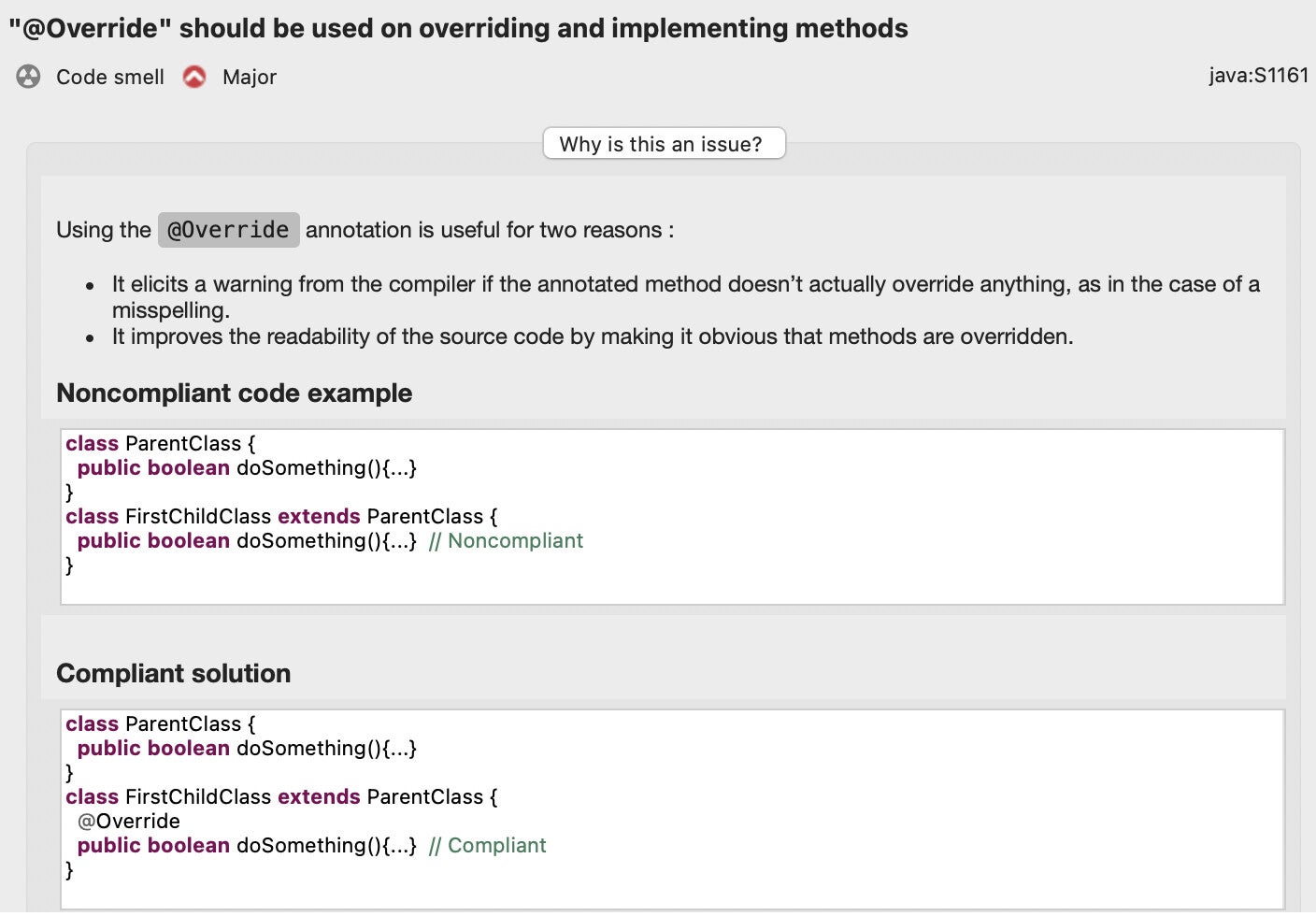
March 18, 2024
SonarQube for IDE: Eclipse v10.0
SonarQube for IDE: Eclipse v10.0 introduces a new architecture that relocates the SonarQube for IDE business logic from the IDE to a background process and enhances IDE responsiveness.
In addition:
- We’ve added 17 new rules for accessibility in HTML.
- We improved the top dismissed JS/TS rules and added one rule (S2004).
- We fixed 13 false positive rules and added 2 new quick fixes for Python.
For further details, check out the release notes and community announcement.

February 07, 2024
SonarQube for IDE: Eclipse v9.3
SonarQube for IDE: Eclipse v9.3 enhances the combined power of SonarQube for IDE and SonarQube Server while streamlining the setup process.
Now, a one-click connection setup and project binding option will be shown to a SonarQube for IDE: Eclipse developer utilizing the SonarQube Server “Open in IDE” button to investigate an issue directly in their IDE. This functionality, which requires SonarQube Server v10.4, assists developers in rapidly examining and resolving issues using SonarQube for IDE directly in their Eclipse IDE.
Plus, with their SonarQube for IDE: Eclipse v9.3 connected to SonarQube Server v10.4, developers can now detect custom secrets in their code, directly in their IDE. Using custom rules based on secret patterns defined in SonarQube Server allows developers to spot secrets before they can be leaked into repositories. (Requires SonarQube Server Enterprise or Data Center Edition).
Also, when using connected mode to SonarQube Cloud or SonarQube Server v10.4, it is now possible to mark an issue as “Accepted”. This results in the unresolved issue becoming part of the project’s technical debt.
In addition:
- 5 Spring Boot rules for Java
- Support for TypeScript 5.3
For further details, check out the release notes and community announcement. For more details on how to set up connected mode check here.

December 05, 2023
SonarQube for IDE: Eclipse v9.1
SonarQube for IDE: Eclipse v9.1 introduces additional benefits for teams working in connected mode to SonarQube Server.
With SonarQube Server v10.3, you can now open any issue you’re investigating in SonarQube Server directly into the IDE, with just a click of a button, thanks to connected mode. This allows you to leverage SonarQube for IDE’s dataflow navigation, rule descriptions, and quick fixes for efficient issue investigation and resolution.
Connected mode for Eclipse delivers shared code quality expectations, deeper issue analysis, smart notifications, and additional language analysis opportunities. Learn more here.
Also:
- Support for Python 3.12 syntax, and 4 new rules related to Python 3.12 features.
- We added 9 Java rules for Spring Boot.
- We introduced 17 new JavaScript rules for JSX.
For further details, check out the release notes and community announcement.

November 14, 2023
SonarQube for IDE: Eclipse v9.0
SonarQube for IDE: Eclipse v9.0 introduces additional team benefits when using SonarQube for IDE in connected mode to SonarQube Cloud and SonarQube Server.
Now, with SonarQube Server v10.2 onwards, you can mark a new issue as Won’t Fix or False Positive without waiting for SonarQube Server to analyze your branch or pull request. Once SonarQube for IDE detects a new issue in your code and you decide not to fix it, you can use SonarQube for IDE to change the issue status. The updated status will automatically propagate to SonarQube Server and to any other contributor using SonarQube for IDE in connected mode.
Plus, when using connected mode to SonarQube Cloud, any issue or security hotspot status change made in SonarQube Cloud will be instantly synchronized to your IDE, ensuring you can focus on relevant issues.
Also:
- 6 Java rules dedicated to the Spring framework
- 5 Python rules for the Pandas library
- New JavaScript rules for React
Lastly, this version raised the SonarQube for IDE required minimum Java runtime version to 17. See here for more details.
For further details, check out the release notes and community announcement.

October 13, 2023
SonarQube for IDE: Eclipse v8.1
SonarQube for IDE: Eclipse v8.1 introduces a new feature supporting the Sonar Clean as You Code methodology. Plus, we have extra rules to detect secrets directly in the IDE and new Python rules for Data Scientists.
SonarQube for IDE is pairing up with SonarQube Server and SonarQube Cloud to deliver the “Focus on new code” feature. Enabled this empowers you to focus only on issues in your new code (i.e., code that has been added or changed according to your new code definition.)
Supporting the Sonar Clean as You Code approach, this powerful feature is available when SonarQube for IDE is working together with SonarQube Server or SonarQube Cloud in connected mode. Learn how here.
In addition, we have incorporated 42 new rules to detect secrets (API tokens, passwords) within your Cloud applications. This enables the immediate detection of secrets in your code when you add or copy/paste them, before you commit or push the code into a repository. This proactive approach boosts confidence in your code and minimizes exposure.
This latest addition brings the total to 100 different types of secrets spanning 60 cloud providers.
Plus:
- New Python rules to help you write clean scientific code using NumPy
- Lots of new React rules
For further details, check out the release notes and community announcement.

September 13, 2023
SonarQube for IDE: Eclipse v8.0
With SonarQube for IDE: Eclipse v8.0 we introduce the adoption of Clean Code attributes to categorize issues, plus enhanced secret pattern detection.
Firstly, we have made various product changes in alignment with our Clean Code vision. For each issue raised in your code, SonarQube for IDE will report the Clean Code attribute and software qualities impacted.
In addition, and leveraging a new Sonar open-source secret detection engine, this version delivers a powerful approach to identifying potential security vulnerabilities related to secrets (tokens, passwords, API keys). SonarQube for IDE can now detect secrets for an additional 22 popular cloud applications and providers.
Plus:
- 9 new core Python rules
- Support for PHP 8.3
- Enhanced SonarQube for IDE documentation is now available here.
For further details, check out the release notes and community announcement.

August 11, 2023
SonarQube for IDE: Eclipse v7.13
SonarQube for IDE: Eclipse v7.13 delivers the opportunity to change the status of an issue without leaving your IDE.
With connected mode activated to either SonarQube Server or SonarQube Cloud, you can now resolve an issue that you don’t intend to fix by marking it as Won’t Fix or False Positive. This newly assigned status will then automatically sync to SonarQube Server or SonarQube Cloud, as well as all other contributors using SonarQube for IDE in connected mode.
For further details, check out the release notes and community announcement.

June 21, 2023
SonarQube for IDE: Eclipse v7.12
SonarQube for IDE: Eclipse v7.12 builds upon the new format for Rule Descriptions with syntax highlighting.
This enhances the clarity of non-compliant/compliant code examples, making it easier for you to understand and take appropriate action. (See example below)
Plus:
- 5 new rules for core JavaScript & TypeScript concepts
- Support for TypeScript 5
For further details, check out our release notes and community announcement.


June 01, 2023
SonarQube for IDE: Eclipse v7.11
SonarQube for IDE: Eclipse v7.11 brings a new format for its Rule Descriptions with the addition of rich educational information to enhance the developer experience.
Now, when clicking on an issue's code in the Error List, you will be presented with contextualized guidance as follows:
Why this is an issue? | How to fix it? | More info
Initially available for a selection of rules including the top 15 security vulnerabilities, this feature is being progressively rolled out for all remaining rules, helping developers learn as they code.
Plus:
- A new Java rule linked to static methods introduced in Java 19
- New rules for TypeScript that enhance our support for TS built-ins
- 6 new Python rules for the Django framework
For further details, check out our release notes and community announcement.

March 01, 2023
SonarQube for IDE: Eclipse v7.8
SonarQube for IDE: Eclipse v7.8 enhances the connected mode setup experience with a new, simplified authentication process to SonarQube Server.
With SonarQube Server (minimum v9.7), SonarQube for IDE now offers to automatically generate and securely store the authentication token for you.
Plus:
- 11 new Quick Fixes for Java rules, making 54 in total. Discover them here.
For further details, check out our release notes and community announcement.

